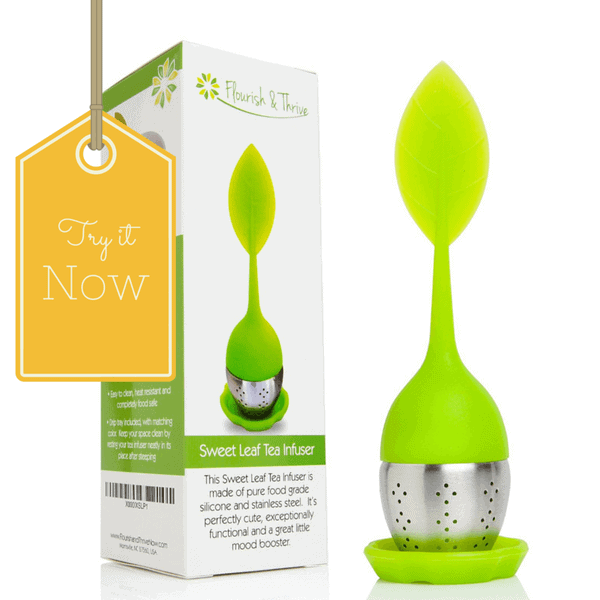When you’re feeling frazzled, a cup of tea can soothe those ragged nerves – and with good reason. Research on the many health-boosting powers of tea shows that not only does a daily cuppa (or more) boost your immune system, reduce inflammation and even keep your memory sharp, many kinds of tea – and even the comforting rituals of preparing it – can reduce stress, calm anxiety and improve mood. The best teas for stress are herbal teas made from plants from around the world.
When stress hits, the whole body and mind are affected.
The stress hormones cortisol and adrenaline flood the bloodstream, causing symptoms such as:
- Rapid heartbeat
- Difficulty concentrating
- Insomnia
- Digestive problems
- Irritability
Though the surge of cortisol and adrenaline is a normal response to threat, far too many people in this fast paced world live with chronic stress that interferes with sleep and contributes to a variety of health issues such as hypertension and cardiovascular disease. Stress and stress related illnesses are so common that many medications have been developed to help – and many people take not one, but two or three of these drugs.
But just brewing a nice cup of tea – or sipping an icy glass – can go a long way toward calming and healing this runaway response to stress, and certain herbal teas contain ingredients that specifically target stress responses.
The overall health benefits of “standard” tea, especially the less processed green and white varieties – have been well documented. The catechins in tea leaves help to reduce inflammation, lower cholesterol, and support the immune system, which indirectly supports the body in times of stress.
But beyond those typical tea leaves we’re most familiar with, there’s a long list of herbal teas made from the roots and leaves of other plants that can calm anxiety, reduce feelings of stress, and improve sleep, mood and energy. The best teas for stress, found in places ranging from Siberia to your own backyard, can lower levels of cortisol and other stress hormones, and boost the brain’s production of mood boosting hormones GABA, serotonin and dopamine for a calming effect.
People have been using teas to heal disease and feel better for thousands of years, though only in recent years has medical research begun to investigate – and confirm – the long-held beliefs about the healing properties of these preparations,
In some cases, herbal teas can outperform pharmaceuticals prescribed for stress and anxiety disorders. The best teas for anxiety contain high levels of “bioactive” compounds such as adaptogens, flavonoids and antioxidants, many of which are s till being investigated. These naturally occurring substances in the leaves, roots and flowers of plants from around the world help reduce levels of cortisol, adrenaline and other stress hormones. They also help to lower levels of the chronic inflammation that’s been linked to diseases as varied as cancer and Alzheimer’s.
The result? Better sleep, improved digestion, reduced anxiety, along with an elevated mood and more energy – all powerful weapons in the fight against chronic stress and the health problems it can cause.
Here’s a short list of the best teas for anxiety, with stress-busting properties that have been confirmed by modern medical studies. These teas are naturally caffeine free, unlike standard green and black teas – an added bonus if caffeine makes you feel jittery and increases your anxiety symptoms
Enjoy the best teas for stress hot or cold, with honey or your favorite natural sweeteners to taste. If you’re new to trying the more exotic varieties, give yourself time to adjust to the new flavors – or consider blending them with other, more familiar varieties or mild green or white tea. Some herbals, such as lavender and chamomile, also work well with fruit juices to make flavorful iced tea drinks.
Explore emotional well-being with BetterHelp – your partner in affordable online therapy. With 30,000+ licensed therapists and plans starting from only $65 per week, BetterHelp makes self-care accessible to all. Complete the questionnaire to match with the right therapist.
Top 10 Best Teas for Stress
1. Chamomile Tea for Stress

Among the best teas for stress is chamomile, best known of the “calming” teas, chamomile (or camomile) tea has a slightly sweet taste and a pale yellow color. It may also be the best tea for anxiety. It promotes relaxation and sleep, so many people drink a cup before bedtime. Rich in antioxidants, it has many of the same anti-inflammatory properties as green tea. It’s also naturally caffeine free.
Because of its mild flavor, chamomile tea can also be brewed with other calming teas such as lavender for a relaxing blend. Because it contributes to better sleep, it can cause drowsiness, though so it’s best taken at bedtime or in the evening.
2. Lavender Tea for Stress

One of the best known teas for stress is lavender. Lavender’s calming properties are well known. Available in forms ranging from essential oils to incense, lavender can soothe anxieties and bring calm. In the form of tea, lavender has antioxidants like regular tea leaves, but without the caffeine. Lavender tea can reduce anxiety and also calm the digestive problems that accompany stress for many people. You can brew a blend of lavender and chamomile tea at bedtime for a soothing sleep inducing drink.
3. Lemon Balm Tea for Stress

Often found in green tea blends, lemon balm contains terpenees, an ingredient that can reduce inflammation and even treat Alzheimer’s disease. It’s also used as a flavoring for foods. Among its documented documented benefits: reducing cortisol, elevating mood and lowering anxiety. It can also be paired with valerian, another stress lowering herb, in a soothing brew. Unlike chamomile tea, lemon balm doesn’t cause drowsiness.
4. Passion Flower Tea for Stress
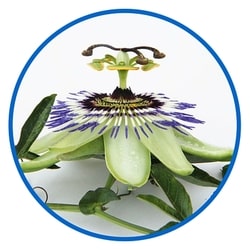
The roots and leaves of the passion fruit plant yields passionflower tea, long prized for its medicinal properties. Today, it’s been shown to improve sleep quality, calm patients before surgery and ease anxiety. It may be more effective in treating generalized anxiety disorder than traditional pharmaceuticals.
Passionflower is rich in a variety of flavonoids and other anti-inflammatory and cortisol reducing compounds. Passionflower is available both as prepared tea in bags and as an extract.
5. Valerian Tea for Stress
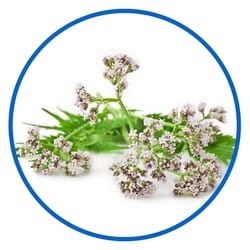
Made from valerian root, valerian is the granddaddy of medicinal teas. Hippocrates prescribed it to treat insomnia back in the 4th century, and today, it’s widely embraced as one of thebest teas fro stress, a calming preparation that, as the storied doctor knew, can help you get a good night’s sleep. Like many of the stress reducing teas, valerian appears to work by lowering cortisol and inflammation in the body and brain.
6. Golden Root (rhodolia) Tea for Stress
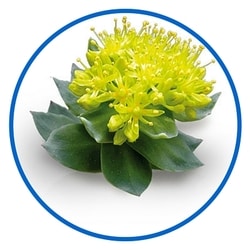
Less well known than its more popular counterparts chamomile and lavender, rhodolia rosea root is among the best teas for anxiety. But rhooolia isn’t specifically a calming tea. It has the opposite effect – boosting mood and energy. It’s believed to regulate hormones and promote serotonin production in the brain, and may support hormone functioning throughout the body. Since it’s an energizing tea, enjoy a cup in the morning or midafternoon.
7. Ashwagandha Tea for Stress

A staple of Ayurvedic medicine, ashwagandha may be the best tea for anxiety.. Its parent plant, withania, somnifera, is a member of the nightshade family, but don’t let that scare you. It’s been used for at least 4,000 years and modern research reveals that it helps the body maintain homeostasis in stressful situations and reduce chronic anxiety by reducing cortisol levels.
8. Tulsi Tea for Stress

Popularly known as holy basil, tulsi tea has also been used for centuries as a general tonic for overall well being. But today it’s valued for its properties as an adaptogen and mood balancer. Not much research has been done on tulsi, but there’s some evidence that it can help reduce the symptoms of generalized anxiety disorder and support adrenal function.
Tulsi can also be combined with other kinds of teas such as African Rooibos and lemon balm for a relaxing concoction that doesn’t make you drowsy.
9. Catnip Tea for Stress
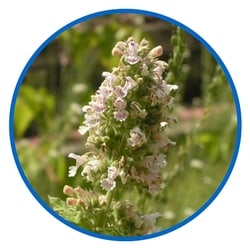
Catnip is usually thought of as a treat for cats, but the same ingredients that make cats love it can also help humans relax and sleep better. Catnip tea can also help relieve digestive distress caused by anxiety and improve mood. It’s available in prepared bags – or you can grow your own catnip plant for fresh leaves that you can dry and brew in a tea ball.
10. Ginseng Tea for Stress

Both true ginseng and Siberian ginseng can help combat the effects of stress. Ginseng, made from the ginseng root, is a staple of Asian healing and helps boost energy and improve circulation.
While it doesn’t have a directly calming effect, ginseng still stands among the best teas for stress since it can combat depression and fatigue by improving circulation and increasing vitality.
Siberian ginseng, though, isn’t actually ginseng at all. It’s made from a plant found in Northwestern Asia,and has been used for thousands of years. One of the best teas for stress, Siberian ginseng is known as a mood booster and adaptogen, helping the body cope with the effects of stress and supporting the immune system during times of stress and anxiety.
Tea, Meditation and Mindfulness
While the bioactive ingredients in herbal teas work directly on the body to reduce stress and improve sleep, other aspects of drinking tea can also play a part in calming the mind and relaxing the body.
The practices of meditation and mindfulness – relaxed awareness of the moment – can play a key role in reducing stress. By focusing attention on what’s in the now, your mind takes a break from fretting about the past and future, which can reduce stress hormones and ease the symptoms.
That’s why tea rituals have been embraced by peoples around the world. From the English tradition of afternoon tea to Japan’s highly formalized tea ceremonies, the habits and practices associated with brewing and drinking tea can also help tame stresses.
You don’t have to conduct a complicated dance of actions to create a calming tea ritual, but choosing a favorite cup, a comfortable moment such as bedtime, and mindful awareness of preparing and drinking your tea can be relaxing in itself – and boost the calming properties of the tea you’re enjoying. Adding a short meditation session to your tea ritual can also help calm a jittery mind.
Adding stress reducing herbal teas to your daily routine can also support other healthy habits, such as establishing a bedtime routine or eating more nutritious foods – all of which can help improve your ability to cope with stress and reduce its effects.
How to Buy and Use Herbal Teas
Herbal teas are relatively inexpensive and easy to find online or in reputable natural food and health stores. These stress-reducing teas can be purchased as loose tea, in tea bags, or even capsules and extracts. Some, like ashwaganda, are sold only in powdered form. And if you have a green thumb, or even if you don’t, you may want to try growing your own lavender, catnip or lemon balm from seed.
If you’re new to loose leaf and herbal teas, one of the best tools you can invest in is a tea infuser. Tea infusers let you pack your loose leaf tea into a container to seep inside your cup. We recommend the Flourish and Thrive Genuine Tea Infuser. It’s cheap and works great!
No upper limit for safety has been established for many of these herbs and they aren’t regulated by the FDA and other food and drug regulators, so it’s important to buy them from quality retailers that don’t add other ingredients into the mix and label their products clearly.
Though stress reducing herbal teas are safe when used in recommended serving sizes, like other natural medicinals it’s important not to overdo. Don’t try them all at once – work them gradually into your daily routine to learn which ones work best for you or cause allergy problems or digestive upsets. Because herbal teas are made from plant parts, people with allergies to pollen or seasonal plants may have allergic reactions to large quantities; so go slowly to find out whether you’ll have problems with teas you haven’t tried before.
Though these stress reducing herbal teas are generally safe for most adults, their interactions with prescription medications haven’t been well studied. So if you are taking any medications, it’s wise to let your doctor know that you’re trying out herbal remedies for your anxiety and stress.
Ancient and natural, herbal teas are rich in powerful ingredients that can help to calm mind and body and reduce the harmful effects of stress. Along with the immune boosting effects of green and black tea, these herbal brews are powerful allies that can improve sleep, reduce anxiety and improve your mood and concentration – all in a steaming cup.

